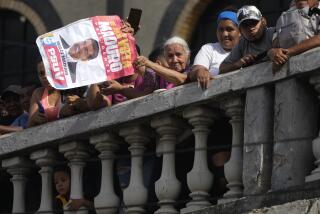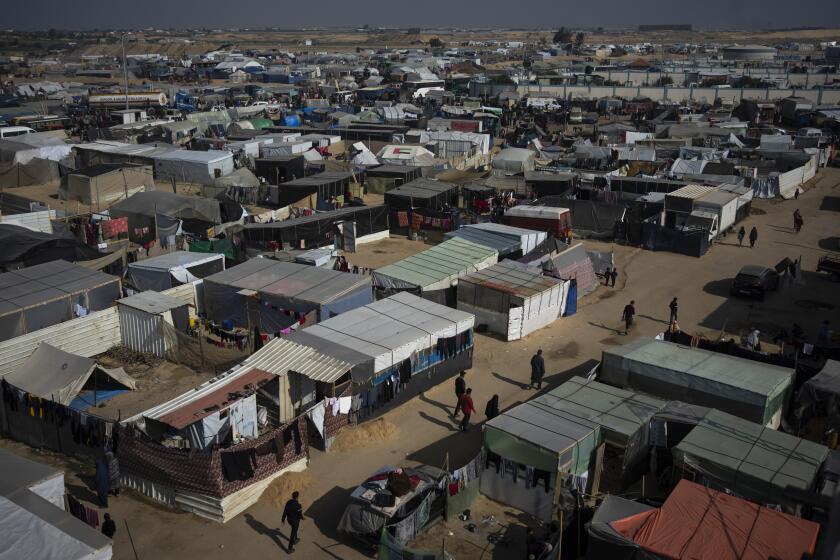2 Kims May Face Showdown at Korea Party Convention
Kim Young Sam, president of the major opposition Reunification Democratic Party, on Monday called a national convention for Nov. 5, setting up a showdown between himself and rival Kim Dae Jung for the party’s presidential nomination.
Buoyed by a huge turnout at a rally Saturday in the southern port city of Pusan, his hometown, the 59-year-old party leader said that with the election just two months away, the nomination issue could wait no longer.
No date has been set for the election, but it is scheduled to take place no later than Dec. 20.
“The Pusan rally demonstrated well to the public who should become the opposition candidate,” Kim Young Sam declared. “Mr. Kim Dae Jung should be aware of this.”
Single-Candidate Promise
At issue is the promise by both Kims that they would field a single opposition candidate, which most political analysts say would assure victory over Roh Tae Woo, the nominee of the ruling Democratic Justice Party. At risk is the possibility that Kim Dae Jung may form another party--Seoul press reports say preparations are already under way--and split the opposition vote.
The Kim Dae Jung camp has so far resisted settling the issue in a party convention. Kim, 63, declared in a television interview last Friday that he is determined to run “in some form.”
“If and when I am convinced that the opposition will lose if we both run, or that people will give more support to Mr. Kim Young Sam, I will be prepared to leave the field to him,” he said. But, he added, “there are two great pressures from the people now. One, that there be a single opposition candidate; the other, for me not to give up and to run and be elected.”
Favors Late-Stage Decision
Earlier last week, Kim, who lost a close election for the presidency in 1971 to the late Park Chung Hee, said that “a single presidential candidate should be decided in the last stage of campaigning by who wins more popular support in the course of stumping.” Both men have scheduled heavy rally programs, and the Pusan turnout has apparently not dissuaded Kim Dae Jung from continuing his campaign.
There was no immediate response from Kim Dae Jung to his rival’s call Monday for a convention. But one of his aides argued in an interview that both Kims, who co-founded the party last spring, hold nearly equal strength among its membership and that Kim Young Sam had no right to call the convention without Kim Dae Jung’s concurrence. Kim Dae Jung is the party’s senior adviser.
Kim Young Sam declared his candidacy Oct. 10. Three times last week, his rival said he was running too, though his aides insist that the official announcement has not been made.
A caucus of the opposition party’s National Assembly members is scheduled today, and press reports said both Kims will attend. Agreement on a single candidacy is considered unlikely, and the Kim Dae Jung camp is expected to demand that the convention be delayed, as has happened at least once before.
Last week, Kim Dae Jung suggested that both men run as independents until “the people” make clear their choice. Kim Young Sam rejected the proposal as “irresponsible.”
“It defies the rule of party politics and the politics of responsibility,” he insisted. “How could a party president run as an independent?”
The two men have been the symbols of political opposition to more than a quarter century of military-dominated governments in South Korea. Both are determined to seek the presidency in the first free election since Kim Dae Jung ran against Park Chung Hee in 1971.
They have been restrained in their public comments about each other since last June’s demonstrations against the government of President Chun Doo Hwan forced a ruling party turnabout on its program to usher Roh into the presidency in an indirect election.
On June 29, after weeks of violent clashes between students and riot police that led the Korean middle class to take a stand against government repression, Roh announced his support for the opposition call for direct elections. He also proposed that political rights be restored to Kim Dae Jung, who had been serving a suspended sentence on a sedition conviction.
Both Draw Huge Crowds
Both Kims, offered the prospect of a shot at the presidency, immediately agreed that the opposition would put up a single candidate. But their target date of a decision by the end of September was not met, and both sides went to work preparing separate campaigns.
Kim Dae Jung’s fortunes brightened last month when a huge throng turned out to welcome him in Kwangju, his hometown, on his first visit in 16 years. More than a third of the city’s 800,000 people turned out to see the dramatic homecoming.
Kim Young Sam’s rally in Pusan, South Korea’s second largest city with a population of more than 3.5 million, was meant to demonstrate his pulling power. His supporters claim that a million or more attended the rally and motorcade.
The ruling Democratic Justice Party has yet to schedule Roh Tae Woo for an outdoor rally, concentrating his campaign in walkabouts in the streets and what the opposition belittles as “gymnasium rallies,” speeches to his followers inside arenas.
While the Roh camp can take pleasure at the prospect of an opposition split, Kim’s Pusan rally obviously caught its attention.
“The huge crowd turnout must have shocked Kim Dae Jung more than us,” the Korea Herald quoted a ruling party spokesman as saying Monday. Then he added defensively: “Kim Young Sam, however, should take note of our party president Roh’s rising popularity.”
Meanwhile, in another sign of political opening here, the Christian Broadcasting System, a Protestant radio station, Monday broadcast news and commercials for the first time since 1980, when the Chun government restricted its programming for alleged political content.
More to Read
Sign up for Essential California
The most important California stories and recommendations in your inbox every morning.
You may occasionally receive promotional content from the Los Angeles Times.






